Global Shares Rise, Nikkei Gains 1.2% After BoJ''s Rate Stance
By Rediff Money Desk, New York Aug 07, 2024 15:21
Global markets rebounded as Japan''s Nikkei surged 1.2% after a BoJ official signaled no immediate rate hikes. The DAX, CAC 40, and FTSE 100 also saw gains.
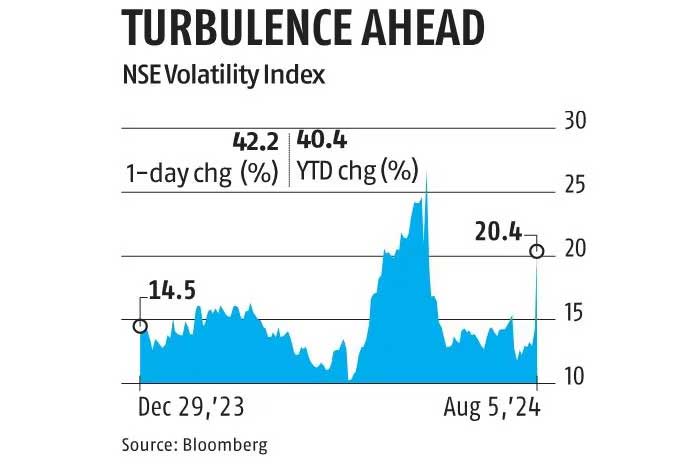
Photograph: Hemanshi Kamani/Reuters
New York, Aug 7 (AP) World shares advanced Wednesday, with Japan's benchmark Nikkei 225 index closing 1.2 per cent higher after a Bank of Japan official suggested the central bank would refrain from raising interest rates while markets are unstable.
Germany's DAX added 1.2 per cent to 17,564.39, as an increase in factory output in June offset concern over weaker-than-expected exports.
The CAC 40 in Paris gained 1.4 per cent to 7,230.21. In London, the FTSE 100 was 0.9 per cent higher at 8,089.70.
The future for the S&P 500 jumped 1 per cent and that for the Dow Jones Industrial Average rose 0.7 per cent.
The Nikkei index bounced during the day but ultimately gained more than 400 points to close at 35,089.62. It soared more than 10 per cent on Tuesday, recovering a large share of the losses it suffered Monday, its worst day since 1987.
The gains followed remarks by a Bank of Japan official who noted that even though the central bank had raised interest rates a week earlier, to 0.25 per cent from 0.1 per cent, monetary policy remains lax.
The interest rate hike, however modest, set in motion a domino effect of selling by traders to adjust to higher costs for carry trades a favorite trade for hedge funds and other investors due to higher interest rates and a rise in the value of the Japanese yen against the US dollar. That accentuated the scale of the declines, especially in Tokyo.
Speaking to business leaders in the northern island of Hokkaido, Shinichi Uchida, a BOJ vice governor, acknowledged the recent market turmoil, triggered in part by concerns over the outlook for the U.S. economy, and said he believed the US would have a soft landing, avoiding a recession.
Japan's central bank can afford to wait, he said, and will not raise its policy interest rate when financial and capital markets are unstable.
Uchida's comments acted like a financial security blanket, calming jittery markets and effectively signaling continued protective intervention, Stephen Innes of SPI Asset Management said in a commentary.
The dollar rebounded against the yen early Wednesday, jumping to 146.78 yen from 144.32 late Tuesday. A weaker yen tends to help profits of export manufacturers that earn most of their revenue overseas, and the yen had surged after the rate hike last week after trading recently at a near four decade low level of 160 yen to the dollar.
Also Wednesday, China reported that its exports rose 7 per cent in July from a year earlier. That was well below the near-10 per cent forecasts of most economists and the slowest rate of growth in three months. It also reflected a low base. Exports jumped 8.6 per cent year-on-year in June, much more than expected.
Hong Kong's Hang Seng closed 1.4 per cent higher at 16,877.86. The Shanghai Composite index edged up 0.1% to 2,869.83.
South Korea's Kospi jumped 1.8 per cent to 2,568.41 and the benchmark in Taiwan jumped 3.9 per cent both markets were among the biggest losers in Monday's sell-offs due to heavy weighting of technology shares that have seen the biggest losses in the past few weeks.
The S&P/ASX 200 in Australia rose 0.3 per cent to 7,699.80.
On Tuesday, the S&P 500 climbed 1 per cent to break a brutal three-day losing streak. It had tumbled a bit more than 6 per cent on a raft of concerns, including worries the Federal Reserve had pressed the brakes too hard for too long on the US economy through high interest rates in order to beat inflation.
The Dow added 0.8 per cent and the Nasdaq gained 1 per cent.
Stocks of all kinds climbed in a mirror opposite of the day before, from smaller companies that need US households to keep spending to huge multinationals more dependent on the global economy.
While fears have risen that the US economy might be slowing too quickly, it is still growing. Many economists see a recession in the next year or so as unlikely. The US stock market is also still up a healthy amount for the year so far, and the Federal Reserve says it has ample room to cut interest rates to help the economy.
In other dealings Wednesday, US benchmark crude oil picked up 35 cents to USD 73.55 per barrel. Brent crude, the international standard, added 36 cents to USD 76.84.
The euro fell to USD 1.0913 from USD 1.0928.
Germany's DAX added 1.2 per cent to 17,564.39, as an increase in factory output in June offset concern over weaker-than-expected exports.
The CAC 40 in Paris gained 1.4 per cent to 7,230.21. In London, the FTSE 100 was 0.9 per cent higher at 8,089.70.
The future for the S&P 500 jumped 1 per cent and that for the Dow Jones Industrial Average rose 0.7 per cent.
The Nikkei index bounced during the day but ultimately gained more than 400 points to close at 35,089.62. It soared more than 10 per cent on Tuesday, recovering a large share of the losses it suffered Monday, its worst day since 1987.
The gains followed remarks by a Bank of Japan official who noted that even though the central bank had raised interest rates a week earlier, to 0.25 per cent from 0.1 per cent, monetary policy remains lax.
The interest rate hike, however modest, set in motion a domino effect of selling by traders to adjust to higher costs for carry trades a favorite trade for hedge funds and other investors due to higher interest rates and a rise in the value of the Japanese yen against the US dollar. That accentuated the scale of the declines, especially in Tokyo.
Speaking to business leaders in the northern island of Hokkaido, Shinichi Uchida, a BOJ vice governor, acknowledged the recent market turmoil, triggered in part by concerns over the outlook for the U.S. economy, and said he believed the US would have a soft landing, avoiding a recession.
Japan's central bank can afford to wait, he said, and will not raise its policy interest rate when financial and capital markets are unstable.
Uchida's comments acted like a financial security blanket, calming jittery markets and effectively signaling continued protective intervention, Stephen Innes of SPI Asset Management said in a commentary.
The dollar rebounded against the yen early Wednesday, jumping to 146.78 yen from 144.32 late Tuesday. A weaker yen tends to help profits of export manufacturers that earn most of their revenue overseas, and the yen had surged after the rate hike last week after trading recently at a near four decade low level of 160 yen to the dollar.
Also Wednesday, China reported that its exports rose 7 per cent in July from a year earlier. That was well below the near-10 per cent forecasts of most economists and the slowest rate of growth in three months. It also reflected a low base. Exports jumped 8.6 per cent year-on-year in June, much more than expected.
Hong Kong's Hang Seng closed 1.4 per cent higher at 16,877.86. The Shanghai Composite index edged up 0.1% to 2,869.83.
South Korea's Kospi jumped 1.8 per cent to 2,568.41 and the benchmark in Taiwan jumped 3.9 per cent both markets were among the biggest losers in Monday's sell-offs due to heavy weighting of technology shares that have seen the biggest losses in the past few weeks.
The S&P/ASX 200 in Australia rose 0.3 per cent to 7,699.80.
On Tuesday, the S&P 500 climbed 1 per cent to break a brutal three-day losing streak. It had tumbled a bit more than 6 per cent on a raft of concerns, including worries the Federal Reserve had pressed the brakes too hard for too long on the US economy through high interest rates in order to beat inflation.
The Dow added 0.8 per cent and the Nasdaq gained 1 per cent.
Stocks of all kinds climbed in a mirror opposite of the day before, from smaller companies that need US households to keep spending to huge multinationals more dependent on the global economy.
While fears have risen that the US economy might be slowing too quickly, it is still growing. Many economists see a recession in the next year or so as unlikely. The US stock market is also still up a healthy amount for the year so far, and the Federal Reserve says it has ample room to cut interest rates to help the economy.
In other dealings Wednesday, US benchmark crude oil picked up 35 cents to USD 73.55 per barrel. Brent crude, the international standard, added 36 cents to USD 76.84.
The euro fell to USD 1.0913 from USD 1.0928.
Source: ASSOCIATED PRESS
DISCLAIMER - This article is from a syndicated feed. The original source is responsible for accuracy, views & content ownership. Views expressed may not reflect those of rediff.com India Limited.
You May Like To Read
TODAY'S MOST TRADED COMPANIES
- Company Name
- Price
- Volume
- GTL Infrastructure
- 2.77 (+ 4.92)
- 36711655
- YES Bank Ltd.
- 24.05 (+ 3.40)
- 18879635
- MTNL
- 70.30 (+ 3.66)
- 15839131
- Srestha Finvest
- 2.12 ( -0.47)
- 15080605
- Reliance Power L
- 31.88 (+ 2.15)
- 14608776
MORE NEWS
Godawari Power Q1 Profit Jumps 24% to Rs 287 cr
Godawari Power and Ispat's consolidated net profit for the June quarter rose 24% to Rs...

Hiring Activity Up 11% in July: Report
Hiring activity in India rose by 11% in July, driven by growth in technology, digital...

India Retail Market to Reach $1.4 Trillion by...
India's retail market is projected to reach $1.4 trillion by 2027, driven by...



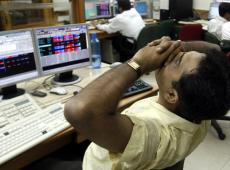
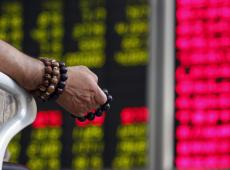

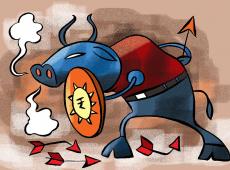

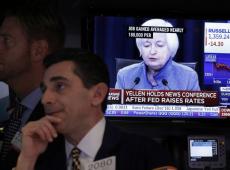
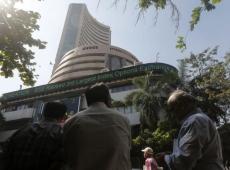
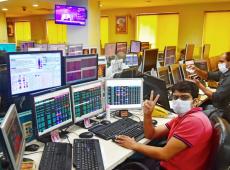
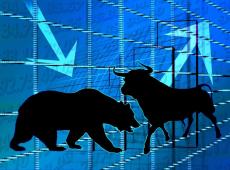
 © 2024 Rediff.com India Limited. All rights reserved.
© 2024 Rediff.com India Limited. All rights reserved.